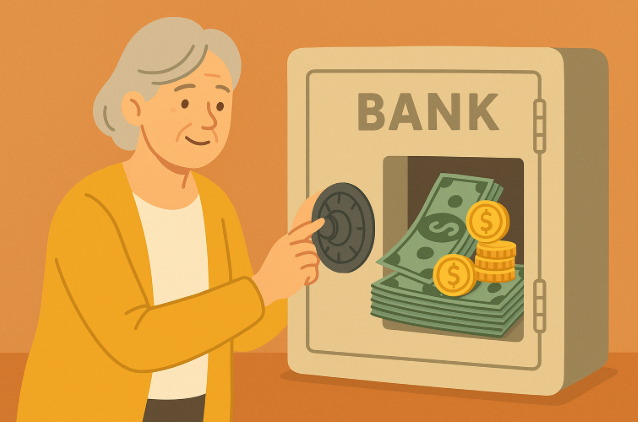Introduction
How Much Money Can You Have in the Bank on Pension Credit? In the UK, pension credit is a means-tested payment intended to help low-income retirees. Understanding how much money you can have in the bank on Pension Credit is crucial, as savings directly impact your eligibility and the amount you receive.
This guide explains how savings affect Pension Credit entitlement and how the system works in detail. By understanding the thresholds and rules clearly, pensioners can make informed financial decisions and avoid losing out on vital support.
What is Pension Credit and Who is Eligible in the UK?
What are the two types of Pension Credit?
- Guarantee Credit: This ensures a minimum level of income. For the 2024/25 financial year, it tops up income to at least £227.10 per week for a single person and £346.60 for couples.
- Savings Credit: Only those who attained State Pension age prior to April 6, 2016, are eligible for this. It rewards those who have made modest savings or contributions to a pension. The maximum amounts are £17.30 per week for singles and £19.36 for couples.
Additional benefits of Pension Credit include:
- Free TV licence for over-75s
- Council Tax Reduction
- Cold Weather Payments
- Assistance with transport, spectacles, and NHS dental care
What is the difference between Pension Credit and Guarantee Pension Credit?
| Feature | Pension Credit (Overall) | Guarantee Pension Credit |
|---|---|---|
| Definition | Umbrella term for the income-based benefit | Component of Pension Credit that tops up income |
| Purpose | Supports low-income pensioners with financial aid | Ensures a minimum weekly income |
| Includes | Guarantee Credit and possibly Savings Credit | Only provides income top-up |
| Eligibility Age | State Pension age (currently 66) | Same as Pension Credit |
| Income Threshold | Varies; includes tariff income | £227.10 (single), £346.60 (couple) per week |
| Available to | All low-income pensioners over the qualifying age | All eligible pensioners regardless of savings |
| Link to Savings Credit | May include it if pensioner qualifies | Does not include Savings Credit |
| Impact of Savings | Tariff income affects overall calculation | Assessed via assumed income (tariff income) |
| How Claimed | Automatically assessed when applying for Pension Credit | Part of the standard Pension Credit application |
- Pension Credit refers to the overall benefit, including both Guarantee and Savings Credit.
- Guarantee Pension Credit is a component of Pension Credit aimed at topping up low income.
- Guarantee Credit is the more widely available form, while Savings Credit only applies to older pensioners.
- Depending on your situation, you might receive either Guarantee Credit or Savings Credit.
Who qualifies for Pension Credit in the UK?
- Must have reached the qualifying age, which aligns with State Pension age (currently 66)
- Must live in England, Scotland, or Wales (different rules apply in Northern Ireland)
- Must have a low income and limited capital/savings
- For couples, both partners must be over State Pension age or one over and receiving a qualifying benefit
- Income consists of earnings, savings, other pensions, and the state pension.
Are widows entitled to Pension Credit?
- Yes, widows and widowers are entitled if they meet the standard criteria.
- A recent bereavement may also entitle you to Bereavement Support Payment.
- Widowed pensioners often experience a drop in household income, which could make them eligible.
- It’s important to update the DWP promptly after the death of a partner to reassess benefits.
How Much Money Can You Have in the Bank on Pension Credit?

Is there a maximum savings limit for Pension Credit?
The Pension Credit has no set maximum savings amount. However, because of the income projected from savings, your chances of receiving Pension Credit decrease with the amount of savings you have. If your other income is limited, you may still be eligible for a smaller amount even if you have a sizable amount of wealth.
Key points:
- Savings don’t disqualify you entirely
- Entitlement decreases gradually as savings increase
- Capital over £10,000 reduces benefit via tariff income
What is the £10,000 capital threshold rule?
- Your first £10,000 in capital is totally ignored.
- Once your savings exceed £10,000, each additional £500 (or part of) is treated as if it provides £1 of weekly income.
- The tariff income rule is the name given to this.
Important to note:
- This criterion hasn’t changed in a number of years.
- Even if the actual interest earned is less, DWP applies the standard tariff rule.
How does “tariff income” work for Pension Credit?
- The DWP assumes you are receiving £1 a week income for every £500 (or part) you have above the £10,000 threshold.
- This income is added to your other sources of income.
Example calculation:
- Total savings: £16,000
- Tariff income = (£16,000 – £10,000) ÷ 500 = 12
- Assumed income = 12 × £1 = £12 per week
This £12 is added to your other income when assessing your Pension Credit eligibility.
Example table of savings impact on Pension Credit
| Total Savings | Tariff Income Added to Weekly Income |
|---|---|
| £9,999 | £0 |
| £11,000 | £2 |
| £15,000 | £10 |
| £20,000 | £20 |
What Types of Savings and Assets Count Towards Pension Credit?

Which savings are included?
All forms of accessible capital are considered, including:
- Current and savings accounts
- Fixed-term deposits
- Cash and Stocks & Shares ISAs
- National Savings certificates and Premium Bonds
- Unit trusts, bonds, gilts
- Money held in foreign currencies
- Pension funds not yet accessed if you’re over the minimum pension age
These are considered as they can provide income or be cashed in to support daily living.
What assets are excluded from the calculation?
The DWP disregards several forms of capital:
- Your main residence and any adjacent land
- Personal items such as furniture, vehicles, or clothing
- Life insurance policies with no surrender value
- Business assets if you’re still involved in self-employment
Additionally, compensation payments for specific personal injury or criminal injury awards are sometimes disregarded depending on terms.
How Do Savings Affect the Guarantee Credit and Savings Credit?
How savings influence Guarantee Credit
- Your total income (including tariff income) must fall below the set weekly minimum.
- For example, if you’re single and your actual income is £200 per week and you have £15,000 in savings (£10 tariff income), your total income is £210—so you may still qualify.
- Income from savings does not need to be actual interest earned—DWP applies their own formula.
How do savings affect Savings Credit?
- The Savings Credit is designed for people who have made little retirement plans.
- You qualify only if your income is above the Guarantee Credit threshold but below the upper Savings Credit threshold.
- Tariff income from savings may push your total income above the upper threshold, making you ineligible.
Can You Still Qualify for Pension Credit with High Savings?

Is there a scenario where you can have high savings and still qualify?
Yes. You can still be eligible if:
- Your other income is minimal (e.g., no private pension or earnings)
- Your tariff income from savings is not sufficient to exceed the Guarantee Credit income threshold
Scenarios:
- Someone with £20,000 in savings and no other income would have £20/week assumed tariff income. If they have no State Pension, they may still qualify.
- A pensioner with a modest occupational pension but higher capital may receive partial Pension Credit.
It is always advised to apply, as the DWP will assess your exact eligibility.
How Much Money Are You Allowed to Have in a Bank Account If You Are on Benefits?
- Each benefit has different capital rules. For means-tested benefits:
- Universal Credit: There is no cap, however earning more over £16,000 disqualifies you.
- Housing Benefit: Those who earn more than £16,000 are not eligible unless they have Guarantee Credit.
- Council Tax Support: Like the Housing Benefit regulations.
- Pension Credit does not disqualify at £16,000 but reduces entitlement via tariff income
- It’s important to report changes to capital across all benefits
What Are the New Rules for Pension Credit?
- Online claims expansion: More applications can be submitted online via Gov.uk
- Mixed age couples: Since May 2019, both must be over State Pension age (unless receiving a qualifying benefit)
- Backdating limited: Claims can now only be backdated by 3 months
- Cost of living boosts: Temporary additions for 2023/24 for eligible recipients
- Rising thresholds: Annual increases in Guarantee Credit minimum income levels
- Stay updated through the official GOV.UK site and DWP announcements
How to Report Savings and Capital When Applying for Pension Credit?
What documents do you need?
- Latest bank statements from all accounts
- Investment statements (shares, bonds, ISAs)
- Pension fund valuations (if not drawn yet)
- Evidence of foreign savings or assets
How often do you need to update the DWP?
- At the time of claim and whenever your capital changes significantly
- During periodic reviews (usually annually)
- If you inherit money, receive a lump sum, or cash in assets
Overpayments or legal repercussions may result from failing to disclose changes.
What Are the Common Mistakes When Reporting Savings for Pension Credit?

- Excluding savings or joint accounts with a partner
- Forgetting about accounts with small or zero balances
- Excluding overseas accounts or currency holdings
- Misreporting pension pots that are not yet drawn
- Intentionally giving away money to reduce capital (deprivation of assets)
Being transparent and accurate helps avoid investigations and ensures correct benefit levels.
Are joint savings assessed differently for couples?
Yes. The total savings for both partners are combined and assessed as one. The £10,000 cutoff still only applies to the sum, not to any one person.
What happens if your savings fluctuate above and below £10,000?
- Minor or temporary changes may not need reporting unless they persist.
- If capital remains above £10,000 for several months, DWP may reassess your entitlement.
- Best practice is to notify DWP if fluctuations are significant.
How does the DWP verify your savings?
- They could make advantage of data matching with banking institutions and HMRC.
- Routine checks include requesting statements, verifying asset ownership.
- DWP can review bank accounts, property records, and pension fund access.
Conclusion: Understanding How Much Money You Can Have in the Bank on Pension Credit
There is no maximum limit on how much money you can have in the bank and still receive Pension Credit. However, savings over £10,000 are considered through tariff income, which can reduce your entitlement. It’s essential to report all savings accurately and understand how different capital types impact your benefit. Pension Credit can offer more than just income support, so staying eligible through smart financial planning is crucial.
FAQs
Can I have more than £16,000 and still get Pension Credit?
Yes, as long as your income (including tariff income) is below the qualifying threshold.
Does owning property affect my Pension Credit?
Your main home does not affect your claim. Additional properties may be assessed as capital.
What happens if I withdraw a lump sum pension?
This will count as part of your capital and may affect your entitlement depending on the amount.
Are Premium Bonds included in savings?
Yes, their full value is considered as part of your total capital.
What if I give away savings to qualify for Pension Credit?
The DWP may treat this as deliberate deprivation of assets, and still count the amount against your claim.
I’m Laura Wilson, a passionate blogger and content creator with a deep interest in business, finance, and entrepreneurship. I’ve had the opportunity to write for several premium blogs, sharing insights & practical advice for individuals & small businesses. I’m the founder and publisher of ukbusinessmag.co.uk, where I focus on creating valuable, easy-to-understand content to help UK startups & SMEs grow.



